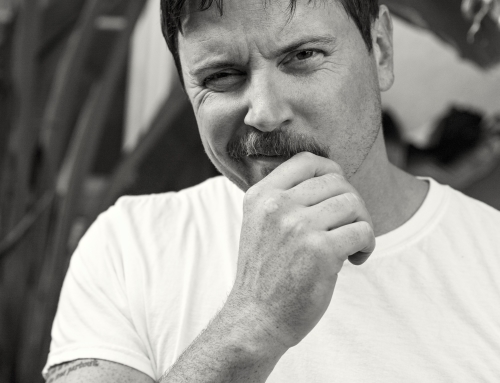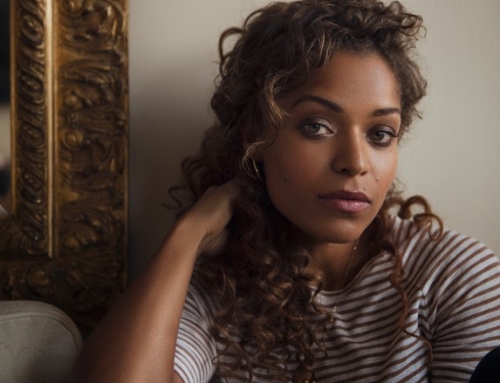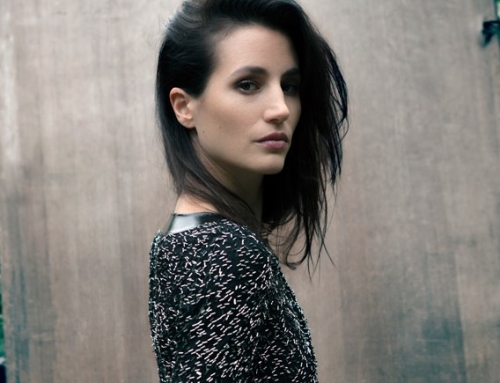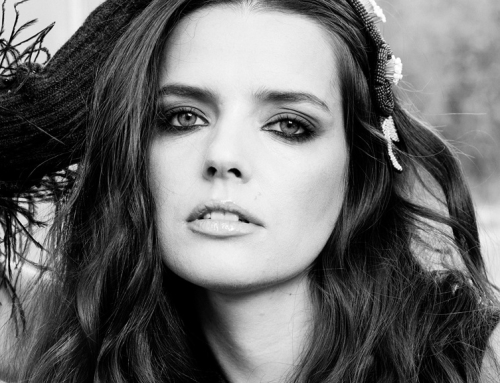The pint-sized Rinko Kikuchi arrives at the studio exuberant in spirit and flair, dressed in a TOGA dress, black combat boots and a bowler hat resting perfectly upright upon her dark bed of hair. The conspicuous chapeau looks to be spoils plucked from the set of Rian Johnson’s The Brothers Bloom. And, like her character Bang Bang in the film, the impish glint colouring the pair of eyes peering out from beneath the rim warns escapades to be imminent.
It’s her first photo shoot in a couple of months and the actress is visibly enthused to begin playing dress up. “Yummy!” she chimes as she pops in and out of outfits, near giddy as she tries on accessories. The Nobuki Hizume hat and Bijules nail rings are instant favourites, or so the animated “yummy!” elicited by the sight of them suggests.
Personal style is not a footnote for Japan’s hottest young starlet. Twenty-eight-year-old Kikuchi counts Karl Lagerfeld—who has dressed her since the beginning of her career—a friend; and, not only does she have the House of Chanel on speed dial, she is a face for the brand. “It’s all so very elegant, and has a sense of youth that Japanese girls love,” she says of the collections. “I feel very comfortable when I wear Chanel, especially when it comes to the red carpet and I know everyone will be looking at me.”
As for the designer, Kikuchi is even more deeply besotted. “He has his own style that he doesn’t waver from, which I admire,” she says. “When you meet the man himself, and see his shows, he really makes you want to wear the pieces.” The unabashed clotheshorse recollects a heart-palpitating visit with the petit mains in the couture atelier: “They blew me away with their precision and passion in their work.”
Kikuchi’s own artistry has earned similar praise.
Regularly introduced in interviews as the only actress to have been nominated for an Academy Award without speaking a word on screen, Kikuchi’s dramatic style qualifies as the strong, silent type. “I guess you could say I work in a very natural … I suppose … “animalistic” type of way,” she hypothesizes. “I don’t think I have much talent for the technical stuff in acting … I really take special care of all of the inspirations around me that come naturally.”
Now a cemented staple on the international festival circuit, one would be hard pressed to find an audience or critic that would agree with Kikuchi’s assessment of her own technical skills, though none would argue the intuitive character of her performances—each a lesson in surreptitious technique.
In the recesses of her mind, Kikuchi unearths the method to her dramatic flair. “I always return to honesty,” she proclaims. “I have to bring out the very subconscious places in my head, but you can’t do that without somehow being conscious of them.”
Seeming to gravitate towards characters embroiled in emotional chaos, Kikuchi often finds herself seeking honesty in the darkest of quarters.
Roles such as that in her latest festival triumph, Map of the Sounds of Tokyo, have the actress sunk deep in sorrow and passion. Playing Ryu, a solitary fishmonger moonlighting as a hired killer who, as indifferent fate has it, falls for a target, Kikuchi scrapes the spectrum of human emotion, and does so with grace.
As stripped down in body as she is in soul to play Ryu, the actress—who shed her clothes for her Oscar-nominated role in Babel—explains nude scenes and graphic love scenes like those featured in Map of the Sounds of Tokyo, are simply a part of a professional acting career. “As an actress, using my body comes with the job,” she says frankly. “When you’re naked, you lay everything out there, so it’s a very pure circumstance to be in. I have to be very honest in what I’m doing or people will look at it and think it’s fake.”
Emotions again run high in Kikuchi’s upcoming release Shanghai, a period drama set in 1940s Shanghai, just before the bombing of Pearl Harbour.
There is no feigning intimacy on-screen affirms Kikuchi; in fact, even off-screen during shooting the actress remains true to her character. She affirms: “I am very focused on and in-tune with the character’s feelings that I’m performing at the time.”
Plagued by unrequited love and diminished life expectations, she fancied her Shanghai character to more likely be found skulking about the deserted cityscape than shopping on High Street in London, where the film was shot. “The story is of a tragedy and I couldn’t bring myself to ignore this character and move on to something else,” she says. “You know, humans have this tendency to find themselves completely on a different track than the one they started on. In [Shanghai], the character is heading towards death … so I supposed [she] would go to parks in London and just sit kind of sit there,” which Kikuchi herself often did.
Happiness, while not found in the emotional repertoire of her character, was doled out in plenty in the form of Gong Li, Ken Watanabe and John Cusack, Kikuchi’s co-stars in the film. “I was in total awe of the cast,” admits the actress. “Everyone was so different and each brought their own unique personalities to their characters.” On set, Kikuchi built a special bond with veteran screen star Gong Li. “I really admired her,” she says. “She’s such a tough woman, but moves so beautifully.”
Like Li, Kikuchi shares DNA with the potent femme fatale, owning a beauty enveloped in a mystique ethereal in essence. She is a triple threat in the most oddly wonderful of ways: a preeminent actor of her generation, a great arbiter of fashion and, as her non-speaking starring roles in Babel and the Brothers Bloom reveal, a bona fide clairvoyant. This, part in parcel with the quirkiness of her general person, makes Kikuchi herself something of a “yummy” screen treat.











